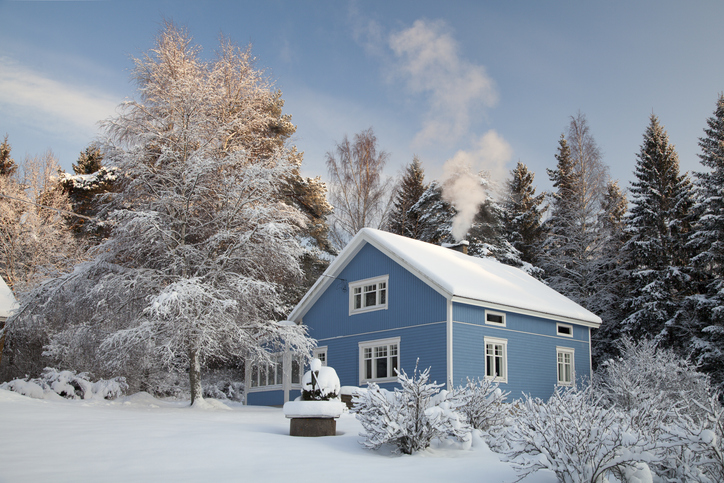
Snow might be perfect for setting a cozy, wintry mood, but for homeowners, it can bring on unwanted damage and repair costs. Whether Pennsylvania sees a snowy winter or a mild one, here are seven tips for protecting your home from snow according to property and construction expert Natalie Mitchell at HomeHow.co.uk.
1. Insulate Your Pipes
“When the weather becomes snowy and icy, this is when you are most likely to come across a burst pipe,” Mitchell says. “Uninsulated pipes in colder areas of the home, such as a basement or loft, are the most likely pipes to burst.”
Insulate pipes by wrapping them before cold, icy weather hits. A burst pipe can cause flooding that’s detrimental to your home and your wallet. Pipes that transport hot water should especially be insulated, as you don’t want to be left without heating or hot water if they burst.
2. Allow Faucets to Drip
“If ice and snow are predicted, it is best to turn on any faucets that are along your exterior walls and allow them to drip a little,” Mitchell advises. “Leaving your faucets to drip will eliminate any pressure from building between the tap and prevent any potential ice blockages. This means even if the pipe freezes, it will be much less likely to burst.”
3. Invest in Some “Grit”
“It is a good idea to invest in some grit for your pathways and driveways,” she adds. “This will help ensure that you can drive and walk around your property without any risks of sliding over. Ice can be very dangerous, so it is best to apply some grit around the property to be on the safe side.”
For those not versed in British terms, grit is equivalent to rock salt. However, some people use sand or a mixture of sand and salt to achieve the same effect, especially during extremely cold temperatures when rock salt isn’t as effective.
4. Consider Your Parking
It may go without saying, but it’s always a good reminder this time of year. Park your car under a cover or inside the garage if possible to keep it safe from winter weather. If parking out in the open, avoid parking near trees or buildings where falling snow/ice could damage the vehicle.
5. Keep Your Home Warm
“It is best to keep your heating on whenever the weather is bad,” Mitchell shares. “This will help to ensure your home remains warm and the water remains running through the pipes.”
Homeowners should aim to keep their homes between 65 and 70 degrees to avoid freezing and dampness.
6. Install Weatherstripping
Snowy and icy conditions can cause homes to feel much colder than usual inside. Homeowners can install weatherstripping around doors, windows, vents and other areas to keep the cold out and the warm in. Weatherstripping is inexpensive and easy to install, and it can also help keep energy bills down.
7. Gather Emergency Goods
Pennsylvanians are familiar with the retail rush that happens when winter weather hits the forecast. Avoid the rush by keeping emergency supplies on hand in case you get snowed in. Mitchell suggests considering the following items for your emergency supply:
- Drinking water
- Non-perishable foods
- Flashlight
- Spare batteries
- Warm clothing
- First-aid kit
- Blankets
- Candles
- Matches
Topics
Member Discussion
Recent Articles
-
New Cumberland Valley Neighborhood Preserves Nature, Plans for 1,000 Homes
- May 2, 2025
- 2 min. read
Grange was transformed from a century-old dairy farm into a modern neighborhood that meets the needs for multigenerational living and various other lifestyles.
-
AANHPI Realtors® Guide Buyers and Sellers With Confidence
- May 1, 2025
- 6 min. read
In honor of Asian American, Native Hawaiian and Pacific Islander Heritage Month, PAR recognizes several AANHPI Realtors® who are making a difference through their work and their commitment to their communities.
-
Several Philly Suburbs Make Niche’s Best Places to Live
- April 30, 2025
- 3 min. read
Here are the Philly suburbs that made Niche’s top 50 Best Places to Live in America, plus one other Pennsylvania location that made the top 100.
Daily Emails
You’ll be the first to know about real estate trends and various legal happenings. Stay up-to-date by subscribing to JustListed.



